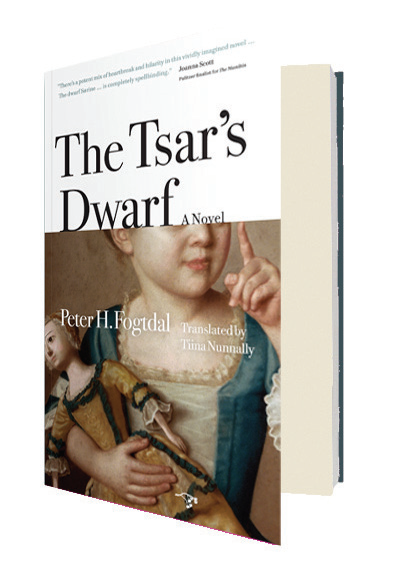CENTRAL QUESTION:
Who decides what is out of proportion?
“My name is Sørine Bentsdatter. I was born in 1684 in the village of Brønshøj. My father was a pastor, my mother died in childbirth.
“When I turned six my body decided not to grow anymore.
“I don’t care for the term ‘dwarf.’
“As a rule, I don’t care for dwarves at all.”
Thus begins and ends chapter one of The Tsar’s Dwarf by Peter H. Fogtdal. Fogtdal is the author of twelve novels in Danish, and The Tsar’s Dwarf is the first to be translated into English. The brisk pace, flip tone, and confounding convictions of its seventeenth-century narrator make the novel, set in the distant past, feel contemporary.
Sørine is self-loathing, but equally self-possessed. If she must endure the scrutiny and disparagement of “fine folk” (who often call out, “Look at the little turd” when she walks by), her own assessments of the fine folk are just as cutting. “His hands are fat and pink, his nails look like shiny seashells. That’s how a human being is. Loathsome and vain, with habits that increase in cruelty the more the person eats.” Physicality is never neutral in The Tsar’s Dwarf. Sørine’s misshapen bones and joints always hurt, and her height precipitates unfortunate proximities. “Once again I’m standing between the legs of servants and footmen. My nose is at the same height as forty one assholes.”
The novel opens in Copenhagen. Sørine’s current companion, Terje, her “Scoundrel,” has consumption. Sørine nurses him (an executioner’s assistant) with herbs. “But gradually I grew weary of my life. I grew tired of the eternal taunts and the smell of blood enveloping Terje.… Maybe that was why I murdered Terje. Because I couldn’t stand it any longer. Because deep down inside I am evil.” Whether Sørine actually commits this murder (and another involving her infant son) remains intriguingly unclear. Though most of her life is out of her control, the choices she does get to make never cease to haunt her.
One of the novel’s keen insights is that Sørine is more attracted to power than afraid of it. When she seeks work at the Danish court, King Frederik IV puts her inside a cake and gives her to Peter the Great. Though the charismatic Russian tsar forces her to drink too much vodka and changes her name to Surinka, she immediately loves him. The Scoundrel, King Frederik, Peter the Great, God—Sørine is drawn to forces with the power to protect her, but she is always treated like an object: given, received, regifted.
Fogtdal widens the potentially narrow first-person point of view by endowing Sørine with “dwarf vision” that allows her to relay and consider events she does not witness; this gives the novel a broader historical scope. Sørine’s internal life, however, her observations of behavior and investigations of belief, are the source of the novel’s zest and contemporary relevance. Educated, both a reader and a writer, Sørine asks great questions. “Is evil the desire to do harm, or is it merely emptiness?”
Painful involuntary sojourns involve a cloister and the Tsar’s Curiosity Cabinet. The cruelty Sørine endures in the name of religion and science will certainly remind readers of recent tragedies. Just as I began to grow weary, wondering what might happen next to Sørine, she makes a bold move that leads the novel back to its compelling premise: people’s physical oddities are no match for the bizarre manifestations of their desire.
Format: 300 pp., cloth; Size: 5 1⁄2” x 9″; Price: $15.95; Publisher: Hawthorne Books; Editor: Kate Sage; Print run: 5,000; Book design: Adam McIsaac; Typeface: Paperback; Translated from the Danish by: Tiina Nunnally; Author has written: twelve novels in Danish; Medicinal herbs illustrated in this book: nightshade, hemlock, great back masterwort, sow thistle, pimpernel, common henbane, burdock, agrimony, gooseberry, butcher’s broom; Representative sentence: “Lukas and I sit astride the pink boars, entering the hall with the distinguished guests, the whippedcream desserts, and the icons.”





